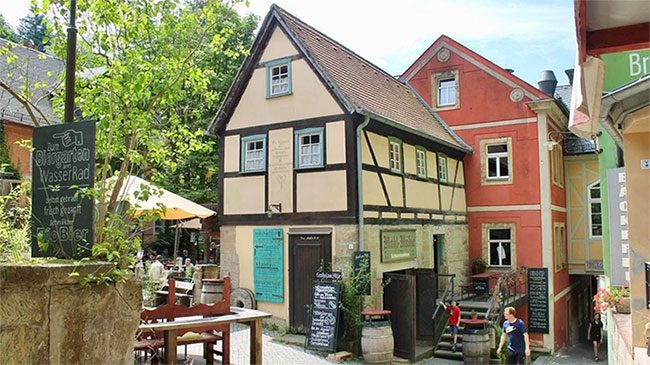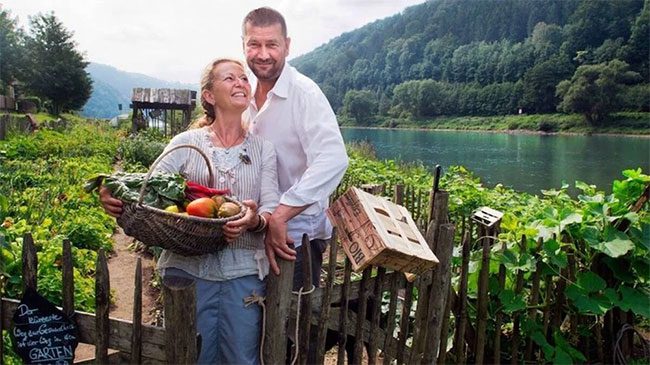If you are looking for a place beyond the digital flow and modernization, Schmilka in Germany is the perfect choice.
Alongside its picturesque landscape, the area exclusively utilizes whole organic cuisine, earning it the title of “healing paradise” for centuries, attracting visitors seeking relaxation and recovery.
Healing Paradise
Schmilka is nestled deep within the forested hinterland of eastern Germany, surrounded by majestic rocky peaks and the rushing Elbe River. Most houses in the town seem “like they stepped out of the 19th century”, evoking a fairytale atmosphere reminiscent of the settings in Grimm’s Fairy Tales.
According to historical records, Schmilka was established in 1582 by Czech lumberjacks. Initially, it was merely a village of spruce woodcutters, with the Elbe River serving as a transportation route for timber.
This facilitated the logging operations and led to an increase in the number of lumberjacks. By the latter half of the 17th century, Schmilka transformed into a town. Due to its remoteness, it gradually became isolated.
In the 19th century, during the “healing through nature” movement, Schmilka reinvented itself as a spa destination. Bathhouses, steam rooms, and outdoor rest areas began to proliferate. Thanks to its lush wilderness surroundings and stunning natural landscape, Schmilka attracted affluent individuals seeking refuge from the noise of urban life.
During the period when Germany was divided into East and West, Schmilka was neglected and fell into disrepair. However, shortly after Germany’s reunification, it regained its status as a captivating, pristine retreat.
Frozen in Time

The houses in Schmilka have a lifespan of over 200 years. (Photo: David Perry).
The person most instrumental in restoring Schmilka is entrepreneur Sven-Eric Hitzer. “In the 1990s, my family and I came to Schmilka to enjoy living in the natural world. Wanting to return again, I decided to buy a house,” he recalls.
Homes in Schmilka are typically half-timbered and half-stone, most of which are centuries old, with a minimum age of 200 years. “The town’s appearance seems to have changed little since its inception. The houses are usually two stories, with the lower level built of stone to withstand flooding and the upper level made of wood, decorated with lacquered paint,” describes local historian Andrea Bigge.
In the 1990s, many houses in Schmilka were empty. Besides purchasing for vacation purposes, Hitzer aimed to preserve the unique architectural style of the area. In 2007, he was encouraged by his wife to buy all the vacant homes in Schmilka and transform the town into a sustainable retreat.
Considering its remoteness, the town of Schmilka is quite isolated. Not only is it sparsely populated, but it also lacks schools, churches, or any heritage sites. Thus, Hitzer was initially hesitant. However, encouraged by his wife, he resolved to make Schmilka a “timeless land.”
For each house he acquired, Hitzer meticulously renovated, converting them into guesthouses without losing their architectural character. The breathtaking mountainous scenery and the long river surrounding Schmilka gifted Hitzer a lucrative opportunity: endless tourist traffic.
For those passionate about hiking, mountain climbing, and nature, Schmilka is an unmissable destination. The remaining residents of Schmilka have followed Hitzer’s lead, renovating their homes into guesthouses to welcome tourists.
“Two hundred years ago, Schmilka was a quiet resort town in nature. Now, it feels like that time has come back. Here, you have no concept of time, no schedule, no purpose. If you ask visitors what they come to Schmilka for, the answer is always to… do nothing,” says Ansgar Rieger, a guesthouse owner in Schmilka.
Healthy Organic Cuisine

The hosts of the timeless town of Schmilka proudly offer healthy organic food. (Photo: Saechsische.de).
When purchasing vacant homes in Schmilka to establish a nature retreat, Hitzer initially had no plans to provide organic food. One day, after a health check-up and being diagnosed as “unwell,” he thought the cause was unhealthy food.
He vowed to avoid unsafe food. “I realized that organic food is not only good for health but also good for the environment, which ultimately led to the idea of sustainable business,” he shared.
Schmilka naturally attracted visitors and new residents with its reputation for “fresh nature” and “limited Wi-Fi world.” Its long-standing residents have also become accustomed to growing their own clean vegetables, given their distance from markets.
“We have always grown our own crops and are very skilled at recycling and utilizing available resources. The town has a 400-year-old brewery that uses traditional brewing techniques.
We even use its waste heat and that of other bakeries for our heating source. You might not believe it, but even the cleaning products here are entirely organic,” says Rieger proudly.
Now, all dishes in Schmilka are organic. Visitors here experience a cleansing of both spirit and body.
While the outside world develops at a breakneck pace, Schmilka remains an untouched haven of tranquility. Even the aroma of the surroundings is as it was hundreds of years ago, a blend of forest and river scents. The residents cherish its stability and have no desire to chase the rhythm of modern life.


















































